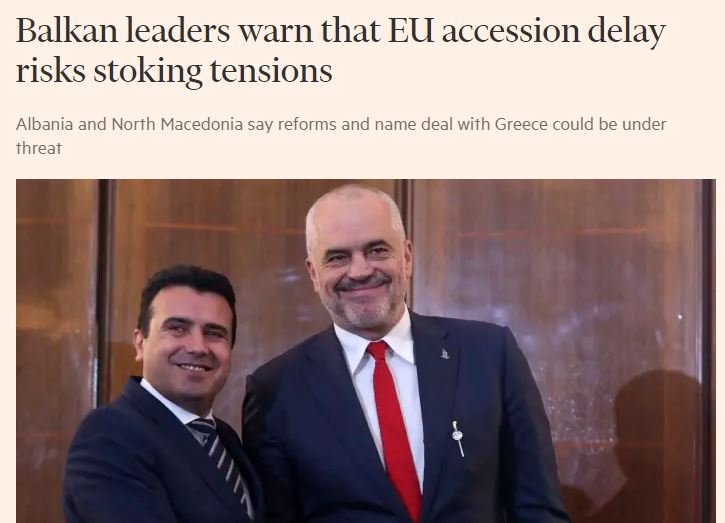In a dual Financial Times interview, Zoran Zaev and Edi Rama vent their frustration with the French veto they received in Brussels last month. Zaev warns about ethnic strife, reversal of the Prespa treaty and Russian interference in the Balkans, if his Government falls in the coming April 2020 elections.
Mr. Zaev said he was worried that a sensitive agreement he negotiated with Greece last year to rename his country could be reopened amid a resurgence of nationalist sentiment. The name change was an important step on the road to joining the EU but was contentious in both countries and Mr Zaev warned that further implementation of the deal struck with Athens was now at risk. “Part of the process is irreversible, but I worry there could be a return to the bad past that we had,” he said, noting the multi-ethnic nature of his country, shared between majority Macedonians and ethnic Albanians. “If there is enough nationalist rhetoric, radical acting and speeches in ‘North’ Macedonia, that will give arguments to Greek politicians to use the same kind of rhetoric . . . And that can lead everyone to take concrete steps which will not be good for my region or my country,”, Zaev is quoted by the Financial Times.
Zaev himself toyed with the idea to freeze the implementation of the Prespa treaty after the French “NON”, but later declared that it was mostly his posturing to Brussels, and part of his push to get the EU to approve the opening of accession talks.
Edi Rama, for his part, blames the EU and declares that it will likely “get worse because it gets better”.
We were cut twice from Europe brutally, once for five centuries under the Ottoman Empire and then for half a century under the most brutal communist regime. No one can live with the idea that there can be a third time, and that this time it can be Europe who cuts us brutally from itself,” the Albanian Prime Minister added.
Zaev also played the Russia card, warning the EU that the Balkans will be open to other influences if the West does not bring it in. Mr Zaev said he worried about attempts to fill the vacuum. “This [decision] gives space for third forces, which are not very helpful, who do not offer us democracy, freedoms, and rule of law,” Zaev told the FT.




Comments are closed for this post.